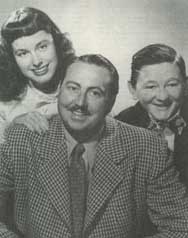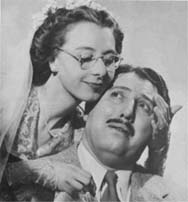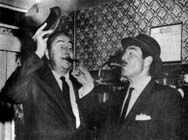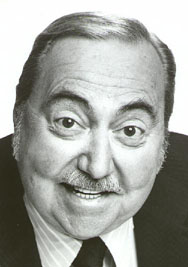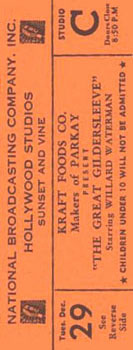Most of the programs for the time that Kraft sponsored the show did survive in recorded form and are available. The most noted exceptions are during the early years of World War Two. The transcription disks used during that period were made by layering lacquer on a glass substrate, rather than the aluminum which had been previously used. The aluminum was needed for the war effort. It is likely that shows missing from that period are missing because the transcription disks broke, glass being far more fragile than aluminum. I think Sperdvac may have posession of a program or two where the disks are too damaged to play.
You never know when a missing show will turn up, though. About a year ago I managed to acquire an AFRS transcription of a 1945 show which seems to be a previously uncirculated program. It originally aired on the network on January 7, 1945 and bears no resemblance to the program which the Jerry Haendiges log indicates aired on that date. I have reality checked this by comparing the recording with a microfilmed copy of the script in the archives of the Wisconsin Historical Society. I will be making that program available to coincide with Radio Studio 2005, an event to be held by a relatively new OTR club in Seattle the weekend of Sept. 10-11. Also, as part of that event, Program number 28, originally aired on March 8, 1942, will be re-created. Program 28 is one of the programs which is not circulating among collectors and probably does not exist in recorded form.
The good news for rabid Gildersleeve fans is that the microfilms at the Wisconsin Historical Society appear to include scripts for all but two of the missing programs from the war years. Hopefully more of them will be re-created in the coming years.
The shows that are hardest to track down and document are from the years after Kraft dropped its sponsorship of the show. From 1955-58 the program was "sustaining" and ran in a couple of different formats. It was a 15 minute serial format program for a year or so and also aired as a 25 minute program, allowing five minutes, presumably for a newscast. The scripts at the WHS were donated by the advertising agency which represented Kraft for all those years so the scripts for the post Kraft years are not in the collection. There are a few programs from the post Kraft era in circulation and a few more have turned up in recent years, generally as AFRTS disks. I have another apparently uncirculated program from 1957 or '58 which will also be made available in Sept. The writing in those post Kraft years was truly abysmal, though.
Sometime in the 60s (or possibly 70s) NBC donated a lot of material to the Black Hole of... sorry, I mean the Library of Congress. That collection includes several Gildersleeve programs which are not in circulation among collectors.
The Great Gildersleeve Episode #28
by Mike Wheeler
In the spring of 1941, the Needham, Louis and Brorby advertising agency gave Hal Peary a green light to record an audition program based on the various Gildersleeve characters which he had developed and portrayed on The Fibber McGee and Molly Show, over the preceding few years. Leonard L. Levinson, an assistant to Fibber writer, Don Quinn, was tapped to write the script. Those who have heard the audition recording find it difficult to understand why Johnson's Wax ultimately declined to pick up the program as a summer replacement for Fibber. They opted, instead, to sponsor a program called Hap Hazard which endured for just that single summer season.
Fortunately, the agency had other clients, among them the Kraft Cheese Company, which agreed to sponsor the program for the 1941 fall season. Len Levinson was the writer for that season as well, and the Don Quinn influence is evident. The program displays a heavy reliance on the classic set-up and punchline humor that typified the Fibber McGee show. Many gags are based on silly word play and bad puns are abundant. Nevertheless, one can detect the makings of the program The Great Gildersleeve would ultimately become, once in the hands of writers like John Whedon and Sam Moore.
Thanks to Kraft, NBC recorded every Great Gildersleeve program as it aired so the cast and writers could later analyze the shows to see what worked and what didn't. Most of those recordings survive to this very day, which is why it is relatively easy to obtain 500 or more programs from any number of dealers or through sharing and trading groups.
Most of the recordings survived but not all of them. During the war years, especially, there are many shows for which recordings do not exist. At least, they are not in circulation among traders. Hope springs eternal. Fortunately, the Wisconsin Historical Society has a collection of Gildersleeve scripts donated in the 1970s by the successor company to Needham, Louis and Brorby. The collection is almost complete, including nearly every script for which no recordings are in circulation. One of the earliest is for Program Number 28 written by Len Levinson and broadcast on the NBC Red network on March 8th, 1942.
It is worth noting that the scripts do not have official titles. All of the titles on circulating programs have been made up by collectors and dealers over the years. Program Number 28 finds Uncle Mort desperately seeking a copy of the Margaret Mitchell masterpiece, Gone With the Wind. How that comes about and why it is so important to the Great Gildersleeve and the children of Flugelhammer Junior High School will be revealed as the script comes to life for the first time in over 60 years at Radio Studio 2005, performed live by The American Radio Theater.











